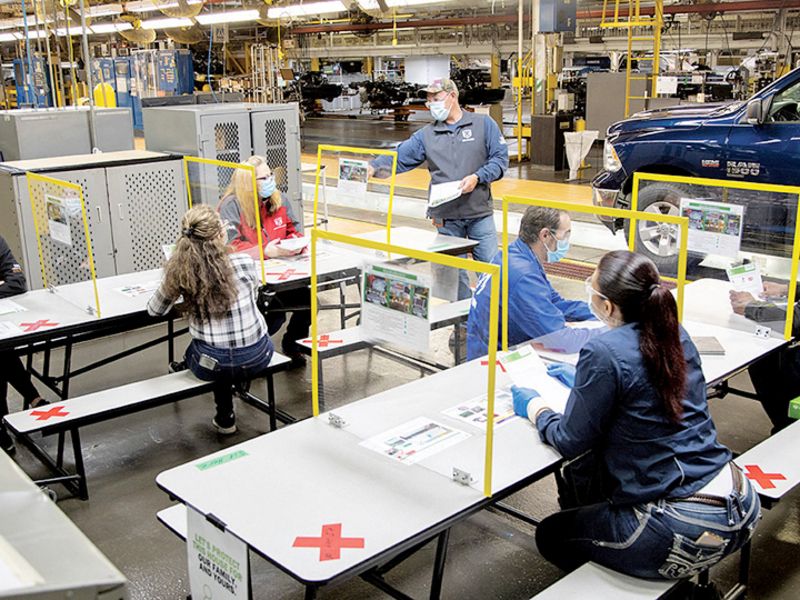
DETROIT — In the second week of production after the coronavirus shutdown, the Detroit 3 aimed to find a balance: Keep factory floors from spreading infection while racing to fulfill orders from dealers desperate for inventory.
All three companies have had confirmed cases of the virus within their plants since they reopened May 18. But because of new guidance from the federal Centers for Disease Control and Prevention, in most cases, they have been able to disinfect affected areas with much shorter stoppages than anticipated.
With two weeks to see how everything was running again, the automakers had to quickly decide whether to forgo the usual summer shutdowns to make up for some of the two months they were closed. The contractual deadline to notify the UAW of planned changes in their production calendars, such as canceling the summer break, is Monday, June 1.
The automakers initially said they would shut down a plant for 24 hours to clean when a positive case of the virus was confirmed. But the CDC on May 22 said high-touch surfaces were not a primary means for the virus to spread. That has allowed production to be minimally disrupted.
Still, the UAW continues to advocate for mass testing within the plants.
“We’re pushing for as much testing as possible right now, and when it is available, we want full testing,” UAW spokesman Brian Rothenberg told Automotive News.
“Our health and safety committees, as well as the union from the local level to the international, are being very vigilant about making sure that protocols are being followed, that we’re sharing best practices,” he said. “We’re looking at any enhancements we can get as they come online to protect our members. Their health and safety is our first priority.”
Ford had to briefly halt work at plants in Dearborn, Mich., Kansas City, Mo., and Chicago after cases of the virus were confirmed.
UAW Local 600, which represents hourly workers in Dearborn, filed a grievance against Ford demanding testing for every worker at the F-150 plant and that the company return to the 24-hour shutdown policy for cleaning whenever cases are found.
General Motors, saying the restart had gone “smoothly thanks to strong teamwork,” planned to resume the second and third shifts at its pickup plants in Michigan, Indiana and Missouri this week and add a second shift at three North American crossover plants. Ford has been running two shifts at its F-150 plants in Dearborn and Kansas City since May 18.
Many dealers are especially eager to get more pickups delivered to replenish dwindling inventory, but they aren’t likely to start getting any for at least several more weeks. On average, it takes a vehicle about a month to go from the factory to the dealership, though transit time varies by dealership and plant locations, said Jeff Schuster, senior vice president of forecasting with LMC Automotive.
“I suspect [the Detroit 3] are pulling out all the stops to shorten the transit time. I would expect some improvement but wouldn’t expect it to be significant, maybe trimming a few days,” Schuster said. “Another option would be to look at where shortages are more pronounced but demand remains. There could be efforts to move product to those dealers or markets first.”